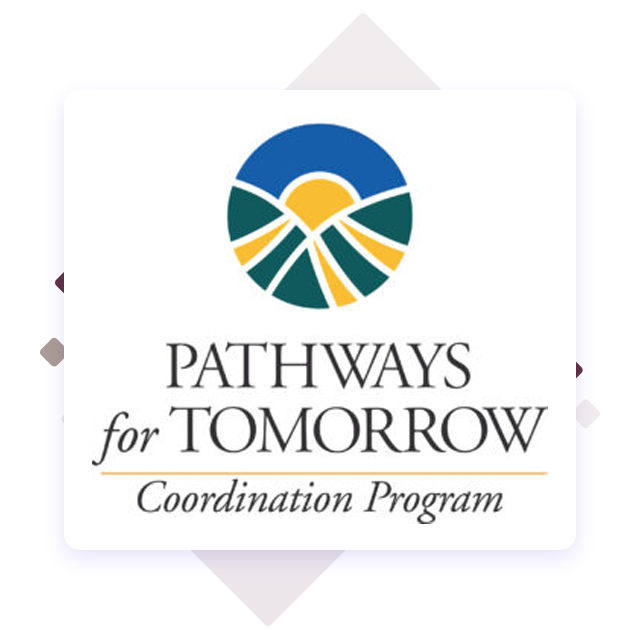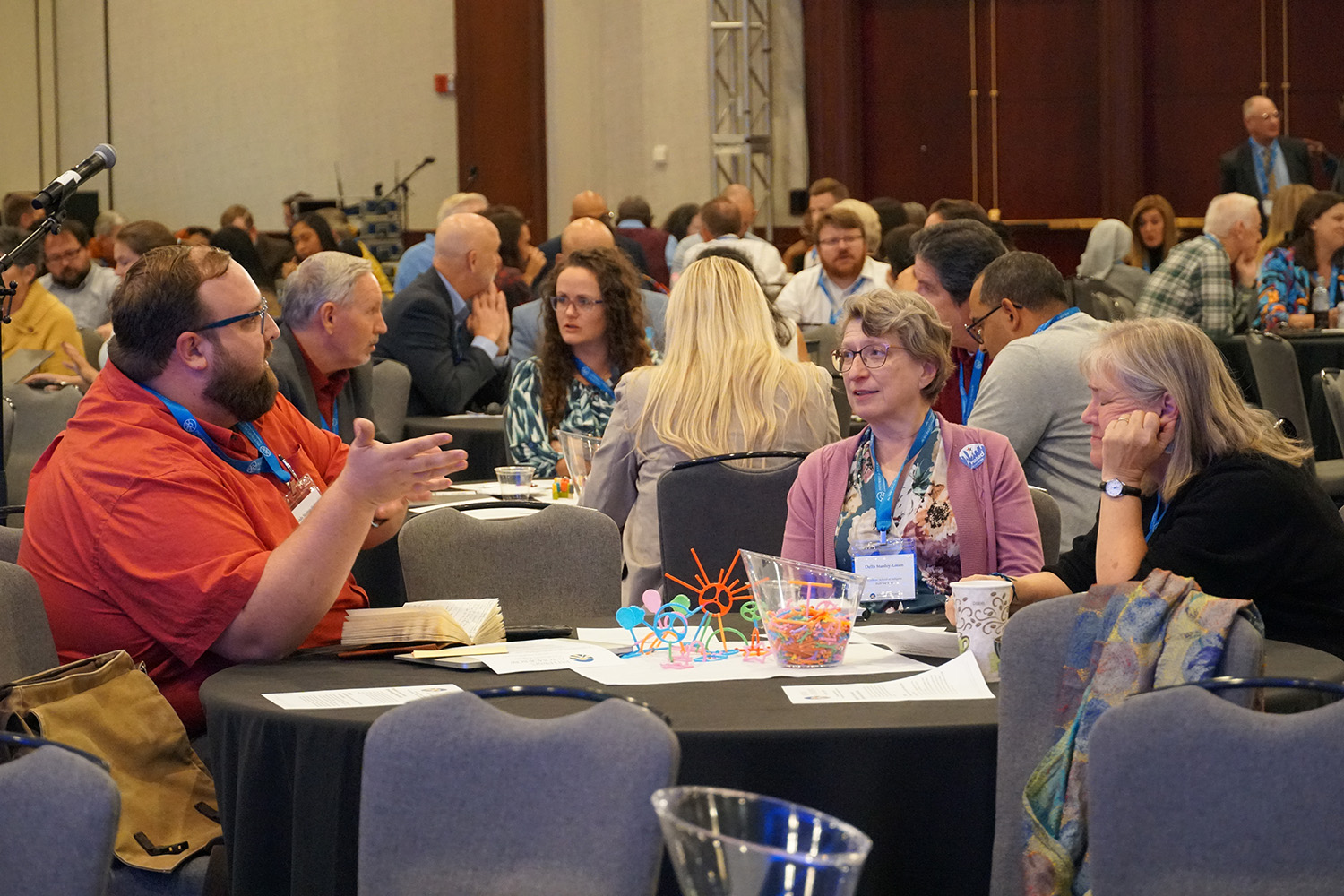What is Pathways for Tomorrow?
The Pathways for Tomorrow Initiative, funded by Lilly Endowment Inc., includes three phases to help theological schools in North America as they work to prepare pastoral leaders for Christian congregations. In the first phase, the Endowment awarded up to $50,000 to 234 schools. In the second phase, the Endowment awarded 106 schools accredited by the Association of Theological Schools (ATS) grants, ranging from $500,000 to $1 million. In the third phase, 16 schools were awarded grants ranging from $5 million to $8 million.
The In Trust Center was awarded a grant from the Lilly Endowment to fund coordination work with the ATS. Our goal is to support the resource needs of grantees throughout the life of the initiative. Together, ATS and the In Trust Center partner to provide resources and research and create and foster learning communities to help encourage innovation and collaboration.
Visit the ATS Website or Contact the Director

Pathways for Tomorrow Initiative
Explore the links below to learn more about Pathways for Tomorrow grants supporting individual schools, as well as large-scale collaborative efforts that extend learning and impact across institutions.
Connecting to Essential Resources
Through programs, services, and transformative initiatives, the In Trust Center serves as a vital partner and valuable resource for our members and affiliates to fulfill their missions – to impact communities, churches, and the world.
In this video, the In Trust Center President, Amy Kardash, discusses the work of the Center and outlines how it will help the Pathways initiative (January 2022).
Learn About our Mission & Vision
Resources
As a resourcing organization, we strive to strengthen theological schools by connecting their leaders to essential resources for mission vitality, including using myriad mediums to convey the Pathways initiative. The following list outlines a few examples.
- In Trust Magazine Articles 20
- News & Insights 71
- Videos & Webinars 15
- Podcast 25

Feature Articles
Inspired by their language of faith
A Pathways for Tomorrow grant is bringing three California schools together to offer students a way…

Feature Articles
Lessons (being) learned
Since its start, the Pathways for Tomorrow Initiative has spurred innovation and brought energy into the…

Feature Articles
Flexible, tailored collaboration partners
Eden Theological Seminary has created a network of schools that will provide students a wide range…

Feature Articles
The new town square
Union Theological School and several others in New York are forging a new way forward thanks…

Feature Articles
What’s the future? And is it all artificial?
Artificial intelligence is found throughout society and now, thanks to things like ChatGPT and Gemini, it’s…

Feature Articles
Choose Your Path
Pacific School of Religion is bringing Silicon Valley together with theological education and a stackable curriculum…

Feature Articles
Rites of Passage
Western Theological Seminary is seeing renewed energy and expanded fundraising happening around its Pathways project.

Feature Articles
A Transformative Path
Latinos comprise nearly one-half of Catholic parishioners in the United States today, a dramatic cultural shift…

The Star
Crafting Narratives, Shaping Futures
The In Trust Center’s website has a page of stories and links about Pathways for Tomorrow…

Feature Articles
Rites of Passage
Two schools in the Methodist tradition are teaming up to find ways to help students and…

The Star
Working on a building
The Pathways for Tomorrow gathering in November 2023 brought 370 people to discuss ideas, trends, and…

Feature Articles
A mentoring mission
For Seventh-day Adventist Theological Seminary, Pathways provides a way forward for pastors to re-engage their communities.

News & Insights
In Trust Center awarded new Pathways for Tomorrow grant
The Center will continue its work to co-coordinate the initiative. The In Trust Center for Theological…

News & Insights
Strategic Shorts: Large-scale Collaboration and the Role of Boards
Strategic Short: Large-scale Collaboration and the Role of Boards

News & Insights
In Trust Monthly Newsletter: July 2025
THE MAGAZINE Flexible, tailored collaboration partners Eden Theological Seminary’s initiative, “Navigating the Shift,” funded by a $5…

News & Insights
Strategic Short: Large-scale Collaboration and Difficult Personnel Decisions
How theological schools can navigate complex personnel decisions during large-scale collaborations.

News & Insights
Resource Grants: Truett Theological Seminary
A Resource Grant from In Trust Center helped Truett host a mental health series.

News & Insights
Strategic Short: Large-scale Collaboration and Integrating Cultures
What it takes to lead successful institutional collaborations

News & Insights
Resource Grants: Concordia Theological Seminary
A campus master plan will address aging mid-century buildings, accessibility needs, and evolving community priorities while…

News & Insights
Strategic Shorts: Large-scale Collaboration and Change of Control
This video explores the formal process of transferring control between institutional boards.

Videos & Webinars
Strategic Shorts
Video Series for Building Institutional Capacity The Rev. David Rowe, Ph.D., Project Director for the Governance Initiative and…

Videos & Webinars
Strategic Shorts: Large-scale Collaboration and the Role of Boards
Focus on the critical role boards play in large-scale collaborations

Videos & Webinars
Strategic Shorts: Large-scale Collaboration and Difficult Personnel Decisions
How theological schools can navigate complex personnel decisions during large-scale collaborations.

Videos & Webinars
Large-scale Collaboration and Integrating Cultures
What it takes to lead successful institutional collaborations

Videos & Webinars
Large-scale Collaboration and Organizational Readiness
Assessing organizational readiness for change and preparing multiple institutions for intensive cooperation.

Videos & Webinars
Large-scale Collaboration and Merging Multiple Brands
Strategies for communicating an institution's brand value to prospective partners

Videos & Webinars
Partnerships that improve institutional sustainability and quality
Webinar explores considerations for institutions pursuing strategic partnerships.

Videos & Webinars
Strategic Shorts: Building Institutional Capacity through Student Readiness
By implementing targeted programs and support systems, institutions can better equip students for academic challenges, thereby…

Podcast
Ep. 98: Creating a virtual neighborhood through an innovative approach to distributed learning
Host Matt Hufman speaks with Rev. Dr. David Vásquez-Levy, president of Pacific School of Religion (PSR),…

Podcast
Ep 94: Lessons to learn from Pathways initiative
As the Pathways for Tomorrow Initiative reaches its midpoint, theological schools are navigating both promising innovations…

Podcast
Ep. 88 – A shared future: Rethinking seminary administration
As theological schools consider how to prepare for the future, a Pathways for Tomorrow Initiative grant…

Podcast
Ep. 85 – The State of Theological Education in 2025
Theological schools across North America are at a pivotal moment. In this episode, Rev. Frank Yamada,…

Podcast
Ep. 83: A misalignment in theological schools – and a way forward
Research by scholars at the Association of Theological Schools suggests a misalignment between how students in…

Podcast
Ep. 82: Lilly Endowment’s expanded Pathways Initiative
Lilly Endowment Inc.’s expanded Pathways for Tomorrow initiative will offer up to $325 million to help…

Podcast
Ep. 81: Creating a Pathway for underserved students in theological education
The Assemblies of God Theological Seminary in Springfield, Missouri, is using Pathways for Tomorrow Initiative grants…

Podcast
Ep. 80: Eden Theological’s move to a network model
Eden Theological Seminary President the Rev. Dr. Deborah Krause and Vice President for Institutional Advancement the…
The Power of Storytelling
Effective storytelling influences your school’s brand and mission. By sharing the strategies and narratives surrounding the goals, expectations, and achievements stemming from the Pathways grant award, you can craft a success story.
In this video, Telling Your Story, Matt Hufman, VP for Communications at the In Trust Center, presents a framework designed to assist theological school communicators to effectively share their narratives. This video can serve as a valuable resource for awardees of the Pathway initiative (March 2022).
Pathway Award Recipients Share Their Stories
Spreading the news and sharing information and resources are components of the Pathways initiative, which are designed to help other schools learn. The following are just a few of the many stories prepared by award recipients, who provide insights, lessons learned, successes, and future expectations. Click on the school name to read the school’s full story.
Search by School Name
-

-

-

-

-

Assemblies of God Theological Seminary at Evangel University
AGTS Pathways for Underserved Student Groups
View Story Visit School -

B.H. Carroll Theological Seminary, East Texas Baptist University
Hispanic Theological Education Program
View Story Visit School -

Barry University and the Southeast Pastoral Institute
Meeting Hispanic Ministry Challenges through the Master of Pastoral Ministry for Hispanics
View Story Visit School -

Berkeley School of Theology
Making Theological Education Accessible, Affordable, and Accelerated
View Story Visit School -

-

Briercrest College and Seminary
Vocational Canada: Multivocational Ministers Project
View Story Visit School -

-

-

-

Columbia Theological Seminary
Pastoral Leadership for the Church of Many Cultures
View Story Visit School -

Duke University Divinity School
Expanding and Enhancing Pathways for Pastoral Formation
View Story Visit School -

Fresno Pacific Biblical Seminary
Cultivating Diverse Leadership in California's Central Valley
View Story Visit School -

-

George W. Truett Theological Seminary at Baylor University
Program for the Future Church
View Story Visit School -

Grace Mission University Graduate School
4-part Initiative: education, multicultural leadership, digital library, IT resources
View Story Visit School -

-

Hood Theological Seminary
Expanding Reach in Anti-Racism, Financial Literacy Online Education
View Story Visit School -

Immaculate Conception Seminary School of Theology
The 4:12 Pathway for Pastoral Leadership
View Story Visit School -

International Theological Seminary
The World Next Door: Increasing Capacity to Prepare Pastors for Immigrant and Ethnic Churches
View Story Visit School -

-

Kairos University
Blazing Trails: Empowering Collaborative Systems of Theological Education
View Story Visit School -

Lexington Theological Seminary
Strengthening Theological Education for Underserved Students
View Story Visit School -

Loyola Marymount University, Department of Theological Studies
Transforming Catholic Leadership in Southern California
View Story Visit School -

Loyola University Chicago, Institute of Pastoral Studies
Miguel Pro S.J. Pastoral Protagonism Initiative
View Story Visit School -

-

Lutheran Theological Seminary, Saskatoon
Our Classroom is Western Canada: We meet there in mission.
View Story Visit School -

McAfee School of Theology of Mercer University
Re-imagining Tomorrow Initiative
View Story Visit School -

Methodist Theological Seminary in Ohio
Connecting Pathways: A Multi-faceted Approach to Strengthen and Sustain Current and Future Faith Leaders
View Story Visit School -

Princeton Theological Seminary
The Isaiah Partnership: Pastors Leading Innovation
View Story Visit School -

-

Sacred Heart Seminary and School of Theology
Specialized Formation for a Universal Church
View Story Visit School -

St. Vladimir’s Orthodox Theological Seminary
Online Education to Equip and Encourage
View Story Visit School -

Union Theological Seminary
Taking off the Roof: Cultivating Collaboration and Ministerial Ingenuity
View Story Visit School -

United Theological Seminary of the Twin Cities
Leadership Center for Social Justice
View Story Visit School -

Vancouver School of Theology
Theological Field Education at VST: Leaders for a New Day
View Story Visit School -

-

Western Theological Seminary
Serving and Connecting Pastors at the Eugene Peterson Center for Christian Imagination
View Story Visit School
Other Initiatives
Discover exciting grant-funded opportunities designed to empower theological schools and their leaders to grow, innovate, and lead with greater impact.

Wise Stewards Initiative
An initiative dedicated to board growth and development via individualized coaching, assessment, and cohort learning.

Governance Initiative
A multi-year award to explore the face of governance, wisest practices and models, and how to best offer support.



















